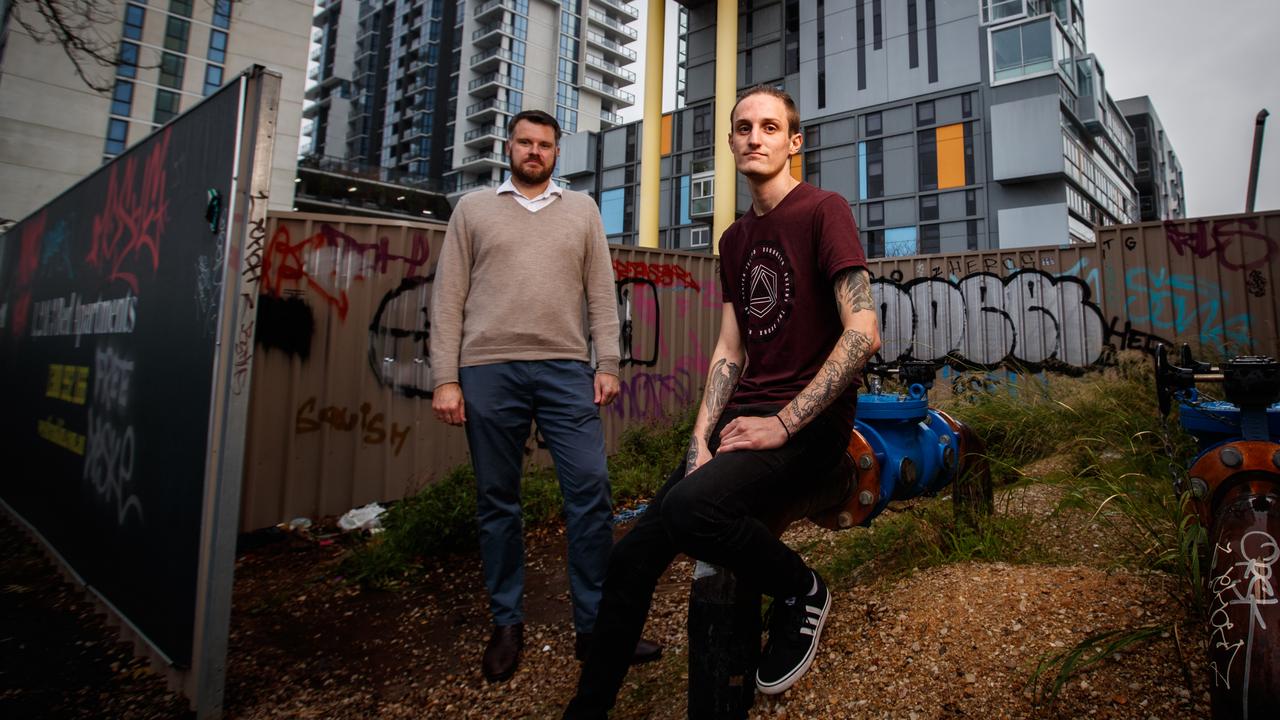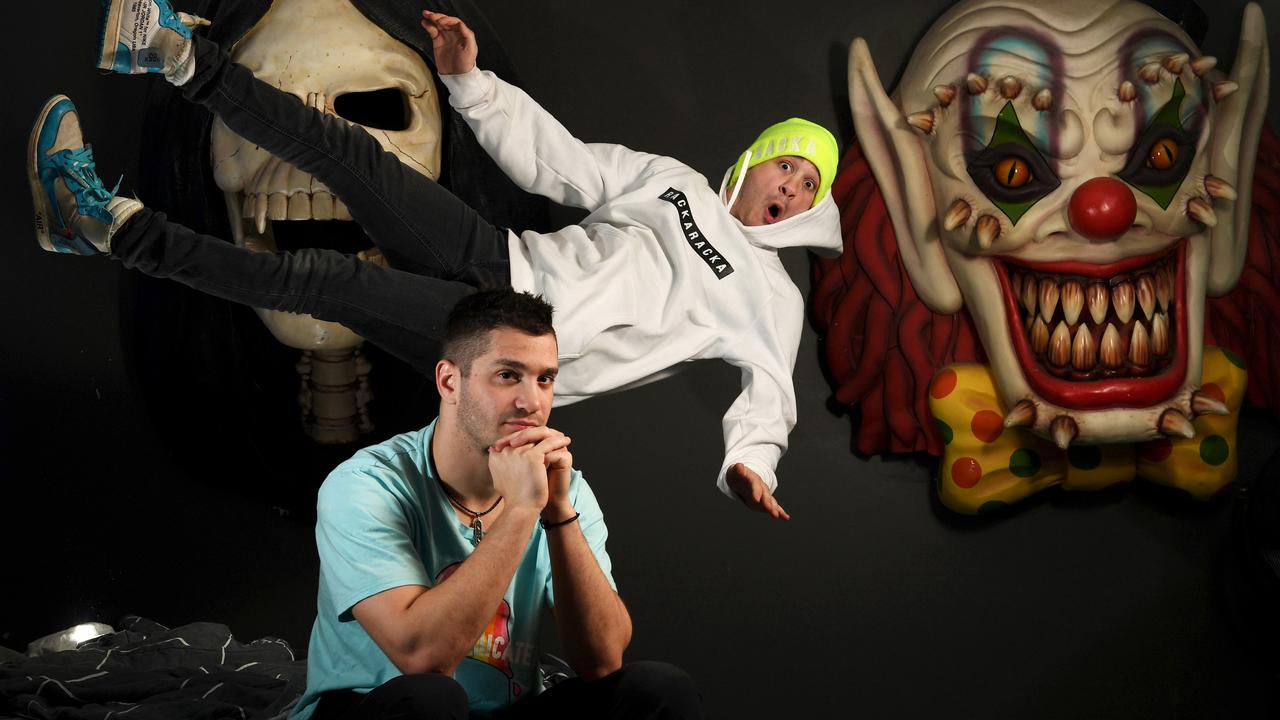The Pellekaan Brief: The star basketballer who became an accidental politician
DAN van Holst Pellekaan was a star basketballer who surprised himself by becoming a politician. Could he one day lead the Liberals?
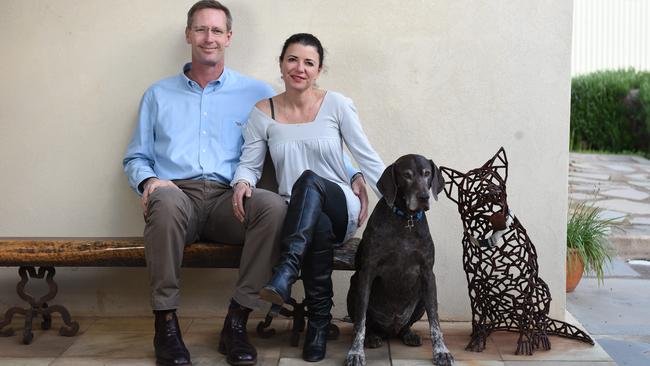
SA Weekend
Don't miss out on the headlines from SA Weekend. Followed categories will be added to My News.
NOBODY expected Dan van Holst Pellekaan to become a politician. Not his wife, not his friends, not even him.
According to the man himself, jumping into politics was “not even a thought bubble’’ for a long time. He had never been a member of a political party, hadn’t dabbled in his university days, had never volunteered on a campaign. He had, though, always been a Liberal voter.
But at some point the thought bubble started to take shape and grew into something slightly more solid. Wife Rebecca, for one, was surprised.
“He hates crowds, he hates being the centre of attention,’’ she says.
Not that she tried to dissuade him.
“Go your hardest,’’ she told him. “Your chance of getting in is zero.’’
Rebecca tells me this with a laugh in her kitchen in the old stone house they call home in the small Mid North town of Wilmington, a dot on the map with a population of around 200, 300km north of Adelaide.
There are other reasons Rebecca was surprised by this sudden change in life direction.
“He is not what you would normally expect in a politician because he is not power hungry,’’ she insists. “Most people’s perception of politicians is that they are in it for the power and Dan’s not in that category at all.’’
Perhaps. Still, there are many other reasons why van Holst Pellekaan is unusual in the world of politics. He was 45 when he entered parliament at the 2010 election as the Member for Stuart in the state’s north. The jump followed a working career that included stints as a labourer, a bouncer, a professional basketball player, an executive with BP, the owner and operator of outback roadhouses and a tourism official.
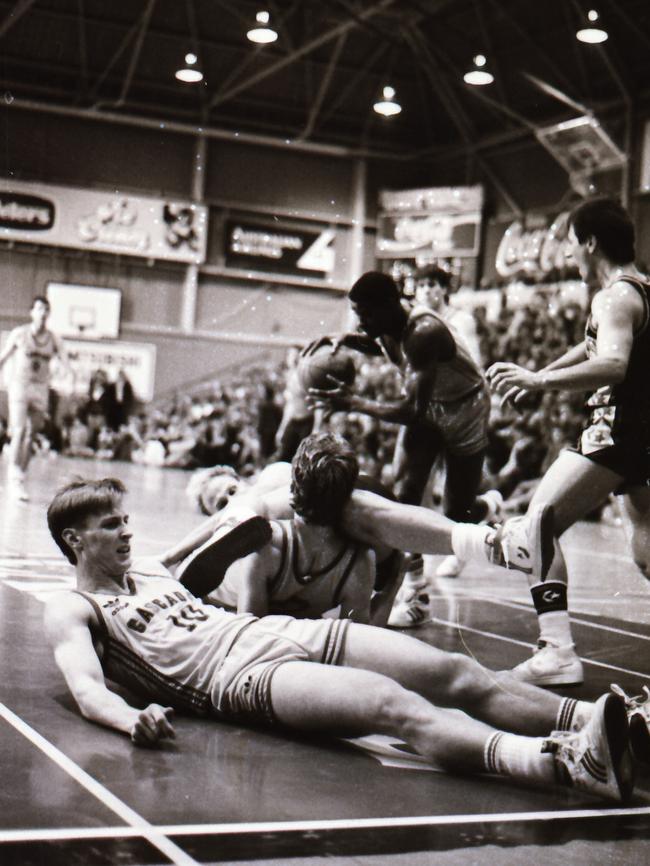
It’s a wider resume than most and a far cry from the growing number of MPs who pursue politics as a career through involvement with Young Liberal or Labor movements, unions, party headquarters or working for politicians.
Now 51, there is a studiousness and a seriousness about van Holst Pellekaan. Even a sense of decency, which can be hard to find in this rough and tumble business he has chosen. Unusually, he has even already put a sunset clause on his political career, vowing to leave before he becomes part of the “dead wood’’ that litters both parties.
He also takes seriously his work as local MP. Stuart includes Port Augusta where the power station closes in May, the already-shut Leigh Creek coalfields, and a landscape which is likely to figure in any talks about a nuclear dump.
“For every MP, sticking up for your patch is your first and foremost responsibility,’’ he says.
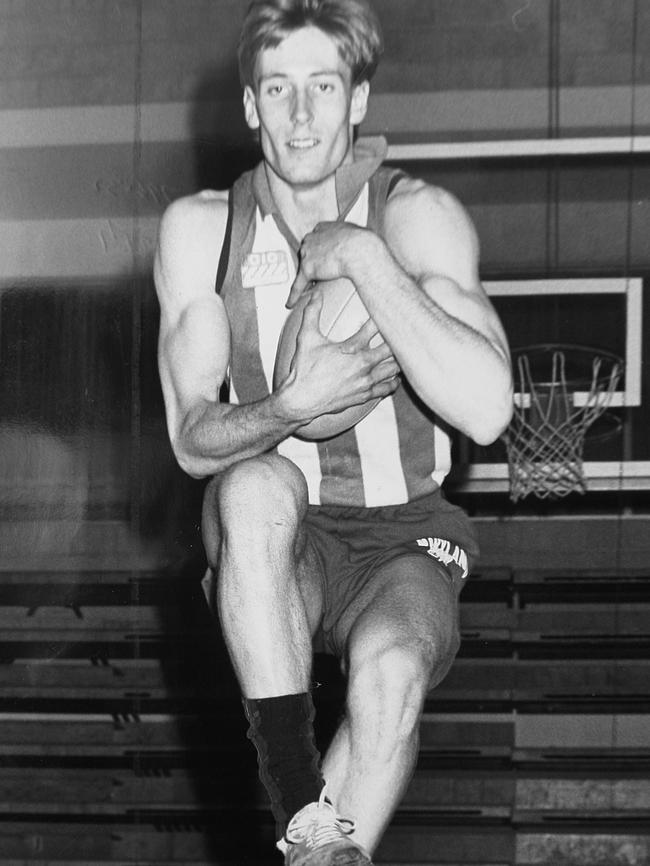
But it’s a combination that is working for him. He has been mentioned as future leadership material within the Liberal Party. Even as a possible contender should the travails of current leader Steven Marshall continue and the polls don’t improve. The biggest note of caution against van Holst Pellekaan being whether he has the ambition and rat cunning that marks successful leaders like Labor’s Mike Rann and Jay Weatherill who have kept the Liberals out of power for the past 14 years.
Such is van Holst Pellekaan’s straightforward manner he finds it difficult to dissemble and evade direct questions. Even ones on leadership ambitions.
“If I were going down to Adelaide every week to try to become premier rather than to try and represent my electorate I am there for the wrong reasons and I wouldn’t deserve the job,’’ he says.
“Having said that, I am not shying away from any opportunities that might come along. As I progress, as I improve, as I get better at what I do and get considered for a wider range of work I am happy to step forward and face those challenges.’’
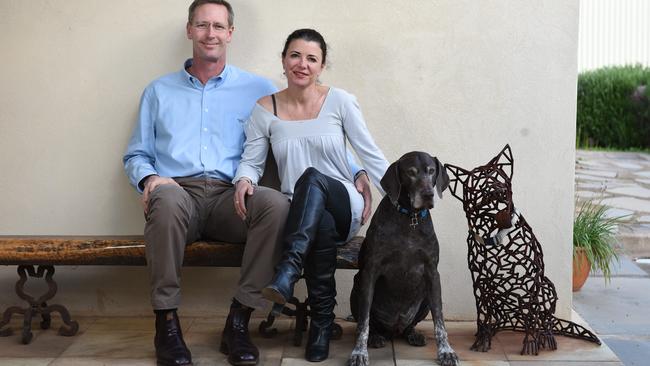
The first thing you notice about van Holst Pellekaan is his height. At 193cm, or 6ft 4 in the old money, you can see why he made it as a basketballer playing four seasons in the NBL for the Tassie Devils. The second is that long and unwieldy surname that must have been a nightmare for the person who had to iron it on to his basketball singlet.
The name is Dutch. His father arrived in Australia as a two-year-old in 1937. But van Holst Pellekaan has never visited the Netherlands or learnt to speak its language. “In hindsight it’s a bit of a shame because any language or any extra understanding is a good thing,’’ he says.
The oldest of three children, he was born in Canberra where his father was an agricultural economist. But at the age of 11 the family was uprooted to Washington DC after his father secured a position with the World Bank.
It was something of a culture shock. “I was just a regular Australian boy, turned up when I was 11, nearly 12, trying to fit in. At that stage of everybody’s life you feel awkward enough anyway as an adolescent,’’ he remembers.
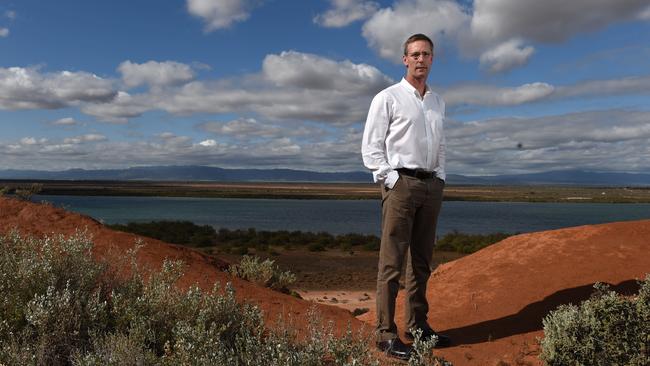
He attended Washington’s well-regarded Maret School but he admits study wasn’t his thing.
“I never liked school. In fact, I disliked school,’’ he says. “I did averagely, just enough to get by.’’
Sport, though, was another matter. It was his key to settling in and being accepted at his school and he threw himself into basketball and American football.
“As a boy I was a fish out of water. I didn’t know what was cool, what you were meant to wear, how to talk. I just realised if I could get good at sport I could fit in.’’
It worked. It turned out he was good at basketball and American football. Van Holst Pellekaan was co-captain of Maret’s football team playing wide receiver and linebacker. He even made the region’s independent school all star team in 1981.
It would be sport that would take him to Canada when he was 18 to study and play basketball at the University of Toronto. But the study thing still wasn’t sticking and he left after 18 months and took a variety of jobs including painting chimney stacks, building houses and as a bouncer in a bar while continuing to play basketball.
It was a call from the Tassie Devils, a team in the National Basketball League, that would bring him back to Australia. They sent a contract and an air ticket and he couldn’t get back quick enough.
It was a good life “playing sport, getting paid’’ but at the end of the first season he realised he had a lot of spare time on his hands. He went back to university and this time decided to do it properly.
He studied economics and by his last year he had won the award for the best aggregate score and had several job offers to choose from. By now he was still only 24 but he decided it was time to make a serious decision.
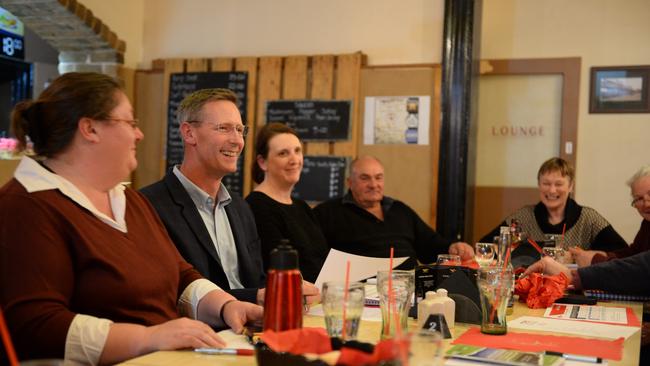
“While I was a good enough player to be in the league I was no star player,’’ he says. “ I realised I could play basketball a bit longer but it wasn’t going to get me anywhere.’’
So he decided to set aside the sporting dreams and took a job working for oil company BP in Melbourne.
“It might have been one of the very first grown-up decisions I had ever made, to be quite blunt.’’
Four years later he came to Adelaide to start a new career in a new town. It was not a place he knew well. There had been flying visits for basketball matches — “didn’t see much of it then, Apollo Stadium and Hindley St’’ – but he quickly fell in love with the place, especially the broad stretches of empty space beyond the metropolis.
His patch for BP would come to cover the regional areas of South Australia, Western Australia, Northern Territory and western Queensland. It was a job that meant he would drive as much as 120,000km a year. In his present job as an MP he has cut that back to just 80,000km annually, still enough that his Commodore station wagon has become something of a mobile office. The boot is full of boxes and files, in the back seat hangs assorted shirts and suits.
Even as a kid in Canberra van Holst Pellekaan loved the outdoor world. “As a little boy I just wanted to go camping and fishing and play outside,’’ he says. “I didn’t like reading. I could take or leave television but I loved being outdoors and that has never really changed.’’
It was the fear of being cooped up in an office that led him to leave BP.
“I knew I had really gone as far as I could go, being in charge of half of Australia before, essentially, my life was in the office for the rest of my working career and I just didn’t like it.’’
The answer was to find a new job in the Outback. He, along with some fellow investors, bought Spud’s Roadhouse at Pimba, a tiny place at the junction of the Stuart Highway and Pimba Rd, which leads to Woomera. It’s another 170km north of Port Augusta.
Over time the business would expand to include roadhouses at Glendambo, Marla and Innimincka. Van Holst Pellekaan lived at Pimba for seven years. It was, he says, “hard, hard work’’.
These isolated roadhouses are combinations of several businesses. Petrol stop, motel, bar, restaurant, workshop, tyre fitter. “You really are very hands on,’’ he says. “You are doing dishes, making beds, fixing tyres, fixing fuel pumps, washing floors. Doing everything.’’
You are also meeting all sorts of different people.
It was never planned but the combination of the exposure to the state’s Outback, the training in dealing with people, the fact that it’s essentially a 24-hour a day job turned out to be a good grounding for a life in politics.
“I think it allowed me to have an understanding of most people from most walks of life, which I think is very important,’’ he says. “If you want to be a good member of parliament you have to have some empathy with everybody.’’
What it also did was give him a feel for the region.
After Pimba he moved into tourism, helping build mountain biking as a tourism attraction in the southern Flinders. He had also met Rebecca at a black tie Royal Flying Doctor event at Wilpena Pound.
Rebecca was a nurse who wasn’t that keen to move to Pimba. Van Holst Pellekaan wasn’t that keen on moving to the city. Wilmington would turn out to be the compromise.
The couple were living in Wilmington when van Holst Pellekaan made the fateful phone call to the Liberal Party. He made the call because he knew Stuart’s long-serving MP Graham Gunn was retiring at the 2010 election.
“People often ask me, who tapped you on the shoulder? Who found you? I say nobody. I called the Liberal Party out of the blue,’’ he says.
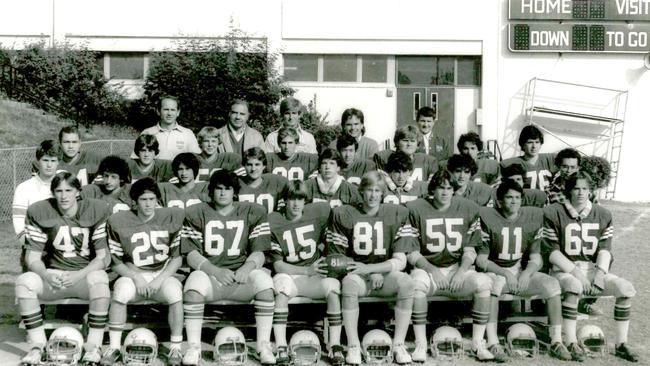
“To the Liberal Party’s credit, I will never forget, they said ‘you are welcome to have a go if you want to’.’’
There’s a certain amount of self-belief that goes along with making that call. Van Holst Pellekaan says he wasn’t motivated by a specific issue, or even disillusionment with the Labor government. In his telling, it was just a deep love for the area where he lived and “I honestly, deeply believed that I had something worth offering’’.
He was also coming from a long way back, competing for preselection against two longstanding local Liberal members and, logically, as Rebecca said, the chances of success seemed slim.
“I didn’t do it lightly,” he says. “I did as much homework as I possibly could. But once I decided I was going to try, then I was into it 1000 per cent.’’
Stuart is an enormous electorate. The second biggest in the state. It stretches from Kapunda in the south, all the way north to the state’s borders with the Northern Territory and Queensland and across to New South Wales in the east. It covers something like 340,000sq km. That’s an area of land only slightly smaller than Germany.
It meant getting out and about and meeting all the Liberal Party members — most of whom who had no idea who he was — and convincing them to back him as their candidate in the 2010 election. That they did. But at that stage Stuart was the most marginal seat in the state. Election to parliament was no certainty.
Again he won. Comfortably as it happened and, after the 2014 election, he had turned the marginal seat into one of the Liberal’s safest with 70.5 per cent of the two party preferred vote.
When you see him interacting with people you can see why.
At a meeting of the Southern Flinders Tourism and Tastes Association in the Orroroo pub van Holst Pellekaan is an interested participant but does not dominate proceedings as the conversation flows between who should be guest speaker at the annual meeting to planning a stand at an upcoming regional show.
Van Holst Pellakaan even suggests a couple of political rivals — Independent Geoff Brock and Labor’s Leon Bignell — as candidates for the AGM speech.
Board member Chris Bretag is a big fan of the member for Stuart.
“He is a top bloke, genuine, honest, hard working and always enthusiastic,’’ Bretag says. “It does not matter who the person is, whether they are top or bottom, he does not treat them any differently.”
Bretag reckons van Holst Pellekaan should be “premier”.
For the moment his responsibilities rest with being the shadow minister for minerals, police, regional development and defence industries.
But his greatest worry lies closer to home, and the future of Port Augusta and Leigh Creek, the places that have been hit hardest by Alinta’s decision last year to close its power station and coal fields.
More than 430 jobs will be lost in a region already suffering from unemployment rates above the state average. Then there is the flow-on effect as that money is removed from the local community.
“I think people underestimate the scale and the urgency of the problem,’’ he says. “It’s not just Port Augusta and Leigh Creek. In Quorn, for example, there are about 35 people who work at one or the other. Thirty-five jobs in the town the size of Quorn is a pretty far-reaching issue.’’
The key, van Holst Pellekaan believes, will be how the site of the power station will be used. His favoured option is to rebuild to make use of the road and rail network that links Port Augusta to the rest of Australia.
“There’s highways to the site. North, south, east and west. There’s railway to that site. Linking to north, south, east and west. You can get a train from Perth to Port Augusta from Alice Springs, from Darwin to Port Augusta.’’
Van Holst Pellekaan says if you could also seal the Strzelecki Track then there would also be a freight route into Queensland.
“There is extraordinary transport infrastructure there that could be enhanced to become a genuinely national intermodal freight hub,’’ he says.
Then there is the nuclear question. The Nuclear Fuel Cycle Royal Commission last week issued its first report and issued some whizzbang numbers that if SA took in nuclear waste it could earn the state $445 billion over 70 years.
Van Holst Pellekaan is happy the debate is being held, and agrees with Royal Commissioner Kevin Scarce that “community consent’’ is needed before the state heads down the nuclear path.
Still, in the wake of Port Augusta, Leigh Creek and the possible closure of the Whyalla steel works in the neighbouring electorate, the MP says waiting for a nuclear solution to the state’s economic troubles is not viable.
With any nuclear dump not expected to start until the late 2020s, it is unlikely van Holst Pellekaan will be in parliament long enough to see it become operational.
He may only have two elections left to make that mark.
Back in the kitchen at Wilmington, Rebecca says when the decision was made for her husband to chase the political dream it was also agreed that he wouldn’t hang on too long. He wouldn’t become part of the “dead wood’’ that is easily spotted on both sides of the political divide.
“Assuming he gets re-elected for three or four terms, so that would be 12 or 16 years, and he said ‘after that remind me I will have to move on and let someone else have a go’.’’
Listening to his wife, van Holst Pellekaan, agrees. “I mean there’s no written rules but I still feel that is about right.’’
As does his and Rebecca’s regret they didn’t have children. “We would have loved to have kids but it just didn’t work out for us,’’ he says. “We probably met just a little bit late in life. There’s not going to be anything of me that will be lived out through the contributions that my kids make.”
And that provides a sense of urgency.
“I have whatever chunk of time to try to contribute throughout my life,” he says. “So I’d better make the very most of it — because I am not going to say I am going to get old and be proud of my son or daughter.’’

